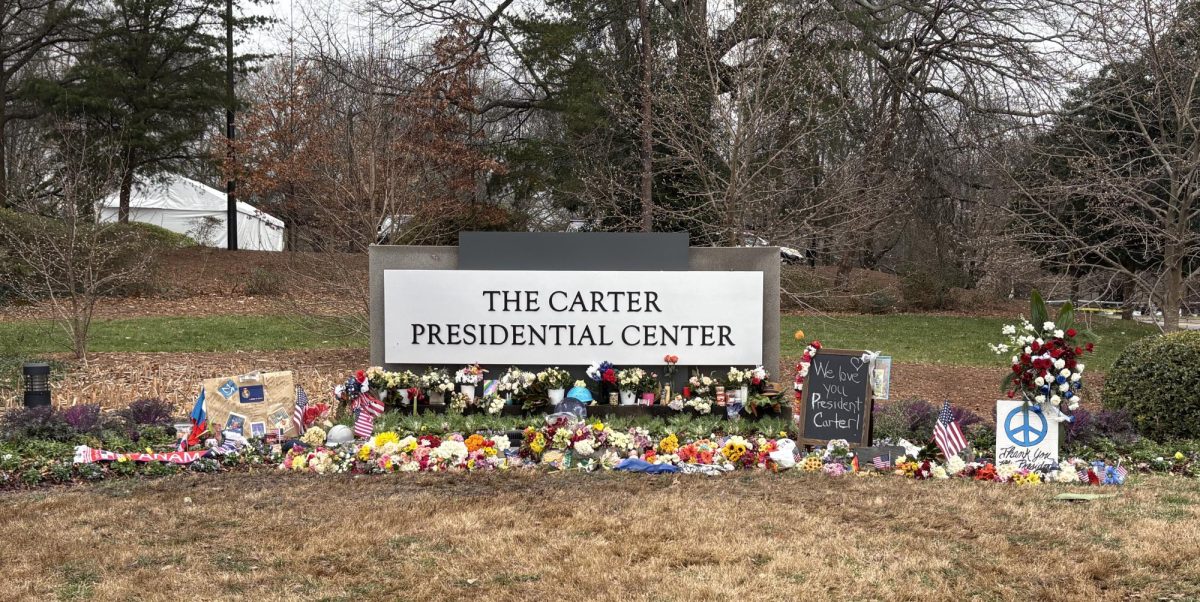At approximately 3 a.m. today, Donald Trump was announced the next president of the United States. The election was a drastic turn from the expected and stunned the country, Republicans and Democrats alike.
Trump, the Republican candidate, won the election with 279 electoral votes, Democrat Hillary Clinton had 228. Clinton, however, won the popular vote 47.7 percent to 47.5 percent.
On Tuesday at 10:20 p.m., the New York Times projected Clinton had an 85 percent likelihood of winning the race. As results rolled in, however, hope for Clinton’s supporters dwindled. Votes from key battleground states such as Wisconsin, Ohio, Pennsylvania and Florida went to Trump and Clinton’s path to victory narrowed. Since the results, both reporters and citizens have analyzed Trump’s controversial path to victory.
After the democratic loss, President Obama offered hope and advice to disappointed Clinton supporters.
“Don’t get cynical, don’t ever think you can’t make a difference. As Secretary Clinton said this morning, fighting for what is right is worth it,” President Obama said. “Sometimes you lose an argument, sometimes you lose an election.”
The day after his election, President-elect Trump released his plan for his first 100 days as president. Some of Trump’s plans include appointing a new Supreme Court justice, deporting illegal immigrants, suspending immigration from terror-prone regions, labeling China as a currency manipulator, canceling payments to U.N. climate change programs, withdrawing from the Trans-Pacific Partnership, re-negotiating or withdrawing from NAFTA (North American Free Trade Agreement) and repealing and replacing the Affordable Care Act, commonly known as Obamacare.
According to Sara Looman, World History teacher at Grady, the political structure and ground operation of the Republican Party was severely underestimated.
“He’s crass. He’s vulgar. He’s a businessman,”Looman said. “He doesn’t come out of the political class, which is, the way I read it, what most of his supporters wanted. What other people clearly saw was someone that was not like everyone else we’ve had [as president] because they didn’t like everyone else we’ve already had. They feel the people we keep sending to Washington don’t care about us.”
Trump ran a campaign which appealed to the ‘forgotten’ citizens of the United States and his victories in swing states were the product of large numbers of voters from rural areas and the white working class. According to Pew Research, he led by 39 percent among white voters without a college degree, comparatively larger than Romney’s advantage in the 2012 election.
“He won because he advertised himself as the change candidate,” senior John Roorbach, who voted for Clinton, said. “Because everyone in America wants a chance at the ‘American dream,’ and they feel he’s the guy that can change things enough to get them there.”
While many in the “Rust Belt” were attracted to Trump’s promise of change, Trump’s comments about women and minorities were met with large public outcry. The poll results, however, showed, Clinton, the first woman presidential candidate, did not have a meaningful advantage with women voters. According to Pew Research, Clinton had a national 12 percent advantage over Trump with women, Trump, however, had the same advantage over Clinton with male voters.
Polls also predicted Clinton would have the lead with minority voters, such as African-Americans, Hispanics and Muslims. Clinton’s advantage over minorities was also not as strong as it needed to be to surpass Trump’s turnout in the polls.
“Hillary Clinton really failed to drive the enthusiasm of her base, she wasn’t turning out African Americans and young people at the rate she really needed to in order to carry this election,” Vice President of Landmark Communications, a public opinion pollster in Georgia, Jordan Fuchs said. “Trump was pulling from nearly every single demographic. He was also winning 65s and older, the senior group.”
Trump won Georgia with 51.3 percent, while Clinton secured 45.6 percent of Georgia’s votes. Fulton county, where Grady is located, however, went to Clinton, with 69.2 percent of votes in her favor versus Trump’s 27.1 percent.
For Paul Lorenc, a 26-year-old Midtown resident who also voted at Grady, his vote was based on the campaigns he saw each candidate run.
“It [the election] really stood for my values. It was a knee-jerk reaction, very emotionally-based versus a more rational way of thinking about things and discussing them,” Lorenc said. “Trump seemed to have a more emotionally-charged campaign, which did really turn me off of him, in addition to his views.”
Clinton called Trump shortly after 2:30 a.m. to concede the election. Despite her loss, young citizens still have hope for a woman president in the future.
“This makes me feel like politics will become a lot more diverse moving forward,” junior class president, Khloe Blake, said. “She [Clinton] opened the door for young women to follow after her.”
Clinton delivered a concession speech Wednesday, thanking her supporters and urging them not to stop fighting for what is right.
“We need you to keep up these fights now and for the rest of your lives,” Clinton said. “And to all the women, and especially the young women, who put their faith in this campaign and in me: I want you to know that nothing has made me prouder than to be your champion.”
Despite this election’s controversy, that heightened tensions between political parties, Trump called for cooperation between all parties.
“Now it’s time for America to bind the wounds of division; have to get together,” Trump said. “To all Republicans and Democrats and independents across this nation, I say it is time for us to come together as one united people.
Fulton County residents cast votes on November 8 at Grady High School polls. Photo by Nafez Zohbi.














